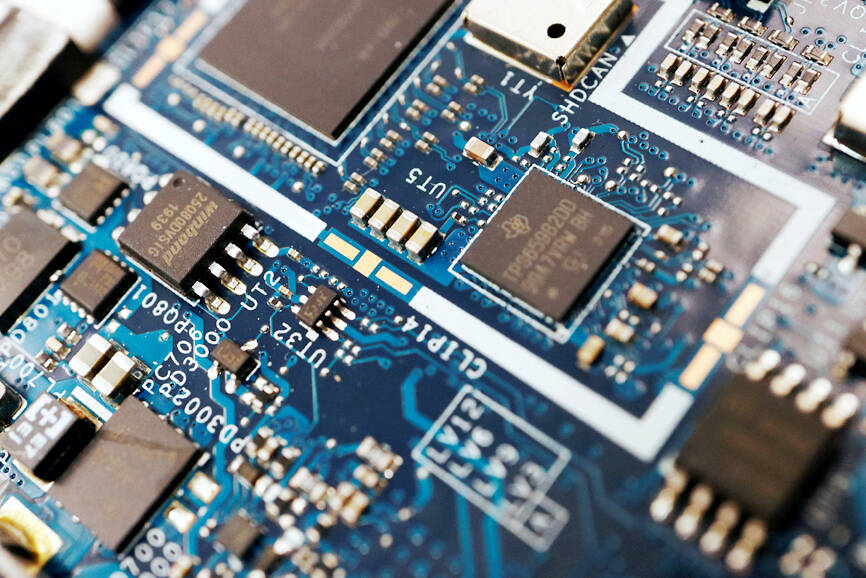The administration of US President Donald Trump is to announce the results of a national security probe into imports of semiconductors in two weeks, US Secretary of Commerce Howard Lutnick said on Sunday, as Trump suggested higher tariffs were on the horizon.
Lutnick told reporters after a meeting between Trump and European Commission President Ursula von der Leyen that the investigation was one of the “key reasons” the EU sought to negotiate a broader trade agreement that would “resolve all things at one time.”
Trump said many companies would be investing in semiconductor manufacturing in the US, including some from Taiwan, to avoid getting hit by new tariffs.

Photo: Reuters
He said Von der Leyen had avoided the pending semiconductor tariffs “in a much better way.”
Trump and Von der Leyen announced a new trade framework agreement that includes across-the-board 15 percent tariffs on EU imports entering the US.
The Trump administration in April said it was investigating whether extensive reliance on foreign imports of pharmaceuticals and semiconductors posed a national security threat.
The probe, being conducted under Section 232 of the US Trade Expansion Act of 1962, could lay the groundwork for new tariffs on imports in both sectors.
The Trump administration has begun separate investigations under the same law into imports of copper and lumber. Earlier probes completed during Trump’s first term formed the basis for 25 percent tariffs rolled out since his return to the White House in January on steel and aluminum, and on the auto industry.
The US relies heavily on chips imported from Taiwan, something former US president Joe Biden sought to reverse during his term by granting billions of dollars in CHIPS and Science Act awards to lure chipmakers to expand production in the US.

Nvidia Corp chief executive officer Jensen Huang (黃仁勳) on Monday introduced the company’s latest supercomputer platform, featuring six new chips made by Taiwan Semiconductor Manufacturing Co (TSMC, 台積電), saying that it is now “in full production.” “If Vera Rubin is going to be in time for this year, it must be in production by now, and so, today I can tell you that Vera Rubin is in full production,” Huang said during his keynote speech at CES in Las Vegas. The rollout of six concurrent chips for Vera Rubin — the company’s next-generation artificial intelligence (AI) computing platform — marks a strategic

REVENUE PERFORMANCE: Cloud and network products, and electronic components saw strong increases, while smart consumer electronics and computing products fell Hon Hai Precision Industry Co (鴻海精密) yesterday posted 26.51 percent quarterly growth in revenue for last quarter to NT$2.6 trillion (US$82.44 billion), the strongest on record for the period and above expectations, but the company forecast a slight revenue dip this quarter due to seasonal factors. On an annual basis, revenue last quarter grew 22.07 percent, the company said. Analysts on average estimated about NT$2.4 trillion increase. Hon Hai, which assembles servers for Nvidia Corp and iPhones for Apple Inc, is expanding its capacity in the US, adding artificial intelligence (AI) server production in Wisconsin and Texas, where it operates established campuses. This

Garment maker Makalot Industrial Co (聚陽) yesterday reported lower-than-expected fourth-quarter revenue of NT$7.93 billion (US$251.44 million), down 9.48 percent from NT$8.76 billion a year earlier. On a quarterly basis, revenue fell 10.83 percent from NT$8.89 billion, company data showed. The figure was also lower than market expectations of NT$8.05 billion, according to data compiled by Yuanta Securities Investment and Consulting Co (元大投顧), which had projected NT$8.22 billion. Makalot’s revenue this quarter would likely increase by a mid-teens percentage as the industry is entering its high season, Yuanta said. Overall, Makalot’s revenue last year totaled NT$34.43 billion, down 3.08 percent from its record NT$35.52

PRECEDENTED TIMES: In news that surely does not shock, AI and tech exports drove a banner for exports last year as Taiwan’s economic growth experienced a flood tide Taiwan’s exports delivered a blockbuster finish to last year with last month’s shipments rising at the second-highest pace on record as demand for artificial intelligence (AI) hardware and advanced computing remained strong, the Ministry of Finance said yesterday. Exports surged 43.4 percent from a year earlier to US$62.48 billion last month, extending growth to 26 consecutive months. Imports climbed 14.9 percent to US$43.04 billion, the second-highest monthly level historically, resulting in a trade surplus of US$19.43 billion — more than double that of the year before. Department of Statistics Director-General Beatrice Tsai (蔡美娜) described the performance as “surprisingly outstanding,” forecasting export growth